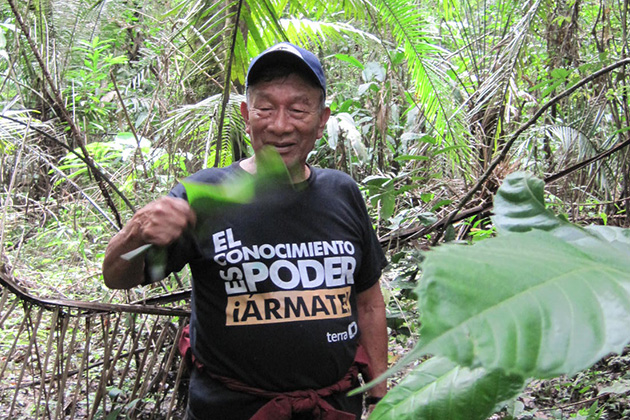
Like most fourth-year medical students, UConn’s Mariah McAlister is in the process of interviewing for prospective residency positions.
Unlike most fourth-years, however, she brings the experience of having spent a year working with a variety of influential integrative health providers throughout the western hemisphere.
A year and a half ago, McAlister stepped aside from the conventional medical school path and into the UConn School of Medicine’s Scholarly Year, an enrichment program in which a student follows a custom-designed year-long curriculum to focus on a specific area of interest. For McAlister, it was anthropology and integrative health.
“I worked with and learned from brilliant healers in North, South, and Central America. Some were originally Western-trained MDs, and many were experts in other disciplines ranging from acupuncture to shamanism,” McAlister says. “I learned a little bit from each of them, and am inspired to eventually build my own practice based on aspects I witnessed in each of theirs.”

One of her interactions was in Peru observing an Amazonian shaman. Some cultures believe shamans can summon spirits to cure illness.
“[The shaman had] trained with village medicine men and women starting at 10 years old,” McAlister says. “This was a particularly fascinating experience because his way of thinking about health, illness, life, death and the world in general is completely different from my own.”
She spent time with him in the rainforest and helped with some of his healing ceremonies, sometimes acting as an interpreter for him and non-Spanish speaking patients.
Her adviser and mentor, Dr. Mary Guerrera, professor of family medicine and director of integrative medicine at UConn Health, helped McAlister create the enrichment curriculum, in part by using her contacts to connect McAlister with a dozen new mentors, with whom she spent about a month each.
“It’s almost like having a sabbatical, taking a year to explore and having the opportunity to go into depth in a topic of their interest,” Guerrera says. “It really opens up the opportunities for students to study across disciplines and to pursue interests that they’ve cultivated at an undergraduate level. In Mariah’s case, it was anthropology. This was a natural manifestation of her interests and how they intersect with health and healing.”

Integrative health is a term that refers to the combination of evidence-based medicine and alternative medicine for which there is evidence of efficacy and safety. Alternative medicine refers to therapies such as acupuncture that are not part of traditional “Western” medicine.
Another of McAlister’s months was spent with a rural naturopath and Chinese medicine doctor in Northern California who functioned as the local family doctor in a town that had no other physicians.
“I loved observing how he analyzed his patients’ complaints with both a Western mindset (naturopaths receive similar foundational training as MDs), and from a Chinese medicine perspective,” McAlister says. “He would then choose whether to use lab tests or referrals to Western specialists, or would treat with acupuncture and herbs. Often he would do both.”

McAlister says she chose UConn for medical school in part because of its membership in the Consortium of Academic Health Centers for Integrative Medicine, which seeks to advance integrative health care principles and practices at North American academic medical centers.
Richard Zeff, assistant dean of medical school admissions, says generally between two and five UConn medical students take a Scholarly Year each year. While McAlister was interested in learning more about integrative medicine for her project, other students have pursued their interests in medicine through research and other scholarly activities.
The director of the Scholarly Year program, Dr. Joan Caron, says the students undergo significant intellectual development while integrating their scholarly ideas with the direction they want to pursue in their medical career. “A maturity develops in these students that is amazing to see,” she says.
McAlister brought her experience back not only to the UConn School of Medicine, but also to the American Medical Student Association. She is organizing the student-run elective “Humanistic Elective on Activism, Reflective Transformation, and Integrative Medicine” that the Association will offer in the spring in Ben Lomond, Calif. In October, she was an invited guest speaker at the Symposium of Integrative Medicine Professionals, held in Albuquerque, N.M.
“It’s helped me tremendously already,” she says.
“The most revealing concept I learned during my enrichment year,” she adds, “was that the therapeutic relationship is at the heart of healing. Whether I was with a pediatrician doing hypnosis for bedwetting, a rural naturopath doing acupuncture to relieve nasal congestion, or an Amazonian shaman chanting an ‘icaro’ to help a woman let go of the pain from her divorce, it was the practitioner’s healing presence that appeared to most affect the patients. I watched as people entered the room with burdens, and left the encounters at ease and inspired to take an active role in their own healing process.”
McAlister plans to be an integrative family medicine physician working in a collaborative setting and advocating for health justice.
Follow UConn Health on Facebook, Twitter and YouTube.



